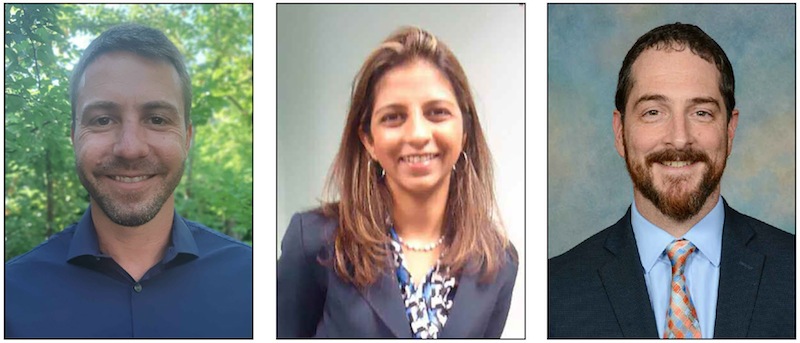Left to right are new heads of school Ian Mills (Shalhevet Girls High School), Sabrina Bhojani (Richmond Jewish Day School) and Rabbi Barak Cohen (Vancouver Hebrew Academy). (photos from interviewees)
Three new principals will be joining the Metro Vancouver network of Jewish day schools this fall. Richmond Jewish Day School, Shalhevet Girls High School and Vancouver Hebrew Academy will all be under the helm of new administrators who bring decades of varied experience to the community.
Ian Mills, who has served as Shalhevet’s social studies teacher for the past six years, is taking over from Meira Federgrun, who has led the school for the past four years. RJDS’s new principal, Sabrina Bhojani, steps into the shoes of outgoing principal Ronit Amihude, who was at the helm for three years. And Rabbi Barak Cohen will be VHA’s new head of school this fall, replacing Rabbi Don Pacht, who served as the school’s head for 17 years.
* * *
Mills, who was born and raised in Dundas, Ont., received his bachelor of arts from McMaster University and his bachelor in education from the University of British Columbia. This past spring, he was accepted into a two-year master’s program at Simon Fraser University.
He also has a broad teaching background, having served as a substitute teacher in Melbourne, Australia, as well as at King David High School. Even when he was studying at UBC, Mills said teaching wasn’t far from his life. He supported himself as a ski and snowboard instructor at Grouse Mountain, garnering both awards and promotions for his work.
“I want students to be true to themselves and recognize what is special about who they are and what they bring to the table,” Mills told the Independent. “Sometimes in education, the grade you receive on a project or test becomes the measuring stick of who you are as a student. Instead, I want students to realize that skill sets come in a wide variety of forms.”
He said the recent updates to the provincial curriculum will help teachers lend support to students’ individual strengths, including “interpersonal skills, social/personal responsibility, leadership, and a host of other ways people are valued – I applaud the fact teachers now have more opportunity to foster these aspects of students.”
* * *
Bhojani, who was born in Ontario, grew up in Metro Vancouver and considers it her home. She received a bachelor of science and a bachelor of education from UBC, as well as a master’s in educational leadership and training from SFU. She served as faculty in the teacher education programs of both SFU and UBC, and worked for the B.C. Ministry of Education, where she developed curriculum and testing methodologies. As a school-based educator for the B.C. Agriculture in the Classroom Foundation, she taught teachers about the importance of agricultural and food knowledge.
“I believe learning about agriculture is an essential component of being a global citizen in the 21st century,” Bhojani said.
She has also worked as an educational consultant for Canadian School Bahrain, a nonprofit whose mandate is to empower children with confidence and the “moral values of integrity, responsibility, respect and courage,” in addition to academic excellence.
“Character education is an important part in developing the whole child and is essential in helping all members of the school community to learn, understand and practise behaviours that reflect universal ethical values,” said Bhojani. “It is essentially what guides us to do the right thing, even when it’s difficult to do so. I believe this is true of all faith-based education, and these kinds of enriching values certainly apply to Jewish education today and tomorrow.”
* * *
Cohen was born in Davenport, Iowa, and studied at Ohr Somayach and the Mir Yeshiva in Jerusalem while completing his smichah (rabbinic ordination). He holds a bachelor’s in behavioural science and a master’s in educational leadership from Bellevue University in Nebraska.
Cohen is no stranger to British Columbia’s Jewish community. He served as rabbi for Aish Hatorah in Victoria before taking a rabbinical position in St. Ives, a suburb of Sydney, Australia. As rabbi for the local Masada College, he launched an enriched Jewish studies program called Torah Stream that became fundamental to teaching elementary school children Hebrew and giving them the building blocks and confidence to study Torah.
“The curriculum was based on standard religious studies programs and outcomes found in religious schools worldwide, and accompanied Masada College’s outstanding general studies offering,” Cohen explained. The program meant that congregants no longer had to bus their elementary school-aged children an hour each way to Sydney to attend Hebrew classes. Cohen was later appointed head of Masada’s elementary school.
“I would define my outlook in Jewish education as one of looking at our incredible history of Jewish scholarship and recognizing that we don’t need to reinvent the wheel,” Cohen told the Independent. “At the same time, there’s always room to better our practice.”
For Cohen, that means “finding ways to more fully engage our students in the depth and breadth of Jewish wisdom, translating that wisdom into 21st-century know-how and building strong foundations in meaningful and relevant knowledge and practice.”
Jan Lee’s articles, op-eds and blog posts have been published in B’nai B’rith Magazine, Voices of Conservative and Masorti Judaism, Times of Israel and Baltimore Jewish Times, as well as a number of business, environmental and travel publications. Her blog can be found at multiculturaljew.polestarpassages.com.

